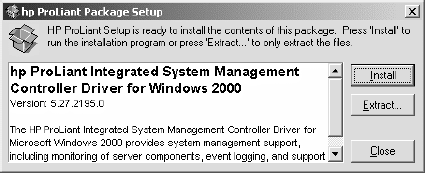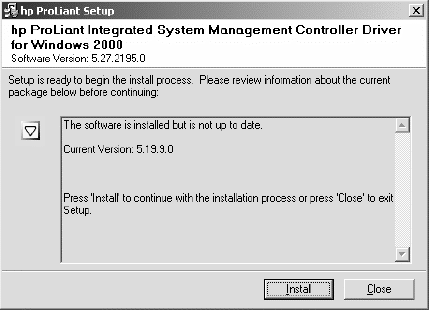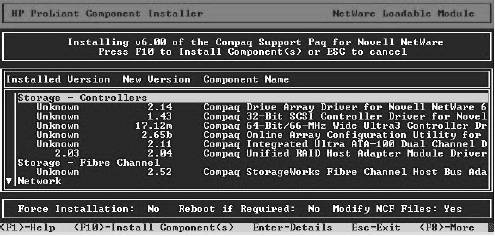15.3. Using ProLiant Support Packs
| < Day Day Up > |
| The PSP is used after installing the operating system to update drivers and install HP utilities and agents on ProLiant servers. The PSP Web site is shown in Figure 15-14. Figure 15-14. ProLiant Support Packs Web site.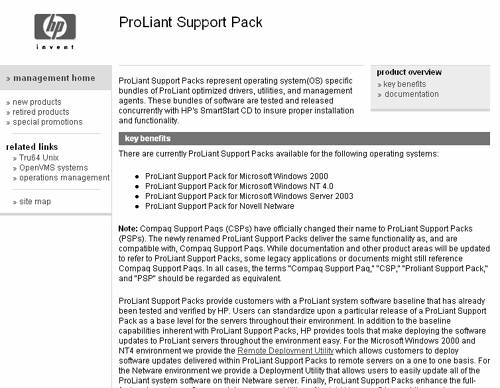 PSPs are operating system-specific bundles of HP server support software. Each PSP includes multiple self-installable components known as smart components (optimized drivers, management agents, and utilities). One of the reasons why the individual PSP components are called smart is that each component checks the system for its installation dependencies (including hardware, software, firmware, and operating system) before installing the software. If the dependencies are not met, the smart component does not install. This design improves and simplifies operating system integration, flexibility, and system configuration. PSP deployment utilities are hardware setup and software maintenance tools that provide an efficient way to manage routine software maintenance tasks. PSP deployment utilities are available for Microsoft Windows NT 4.0, Windows 2000, Windows Server 2003, Novell NetWare, and Linux server environments. PSPs and the PSP deployment utilities integrate with other software maintenance, deployment, and operating system tools. They provide the information and flexibility needed to efficiently install, upgrade, and manage system software and reduce server maintenance costs. 15.3.1 PSP Software Maintenance BenefitsThe PSP deployment utilities provide the following software maintenance benefits to system administrators using Windows, NetWare, and Linux platforms:
Note Some legacy applications or documents might refer to Compaq Support Paqs, but in all cases, the terms Compaq Support Paq, CSP, ProLiant Support Pack, and PSPshould be regarded as equal. The PSP deployment PSPs and utilities can be obtained as follows:
15.3.2 Deploying ProLiant Support Packs in Microsoft WindowsHP provides the following tools for configuring components and deploying PSPs for Windows:
Some of the Smart Components included as part of a PSP must be configured before being deployed. ! Important Components only need to be configured once. The configuration information is stored inside each smart component so that it is available when the component is installed. You do not need to configure components each time they are deployed. However, configuration is independent of the target computer you select. If you change the configuration of a component after you have deployed it, you must redeploy the component. Figure 15-15. Remote Deployment Utility main control window.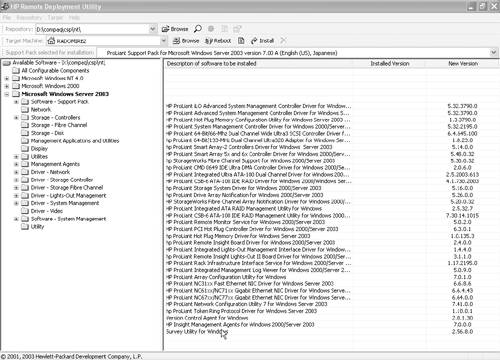 Configurable components include, but are not limited to, Insight Management Agents and Version Control Agent. ! Important The Web-based management portion of the Insight Management agents requires that a user ID, password, and trust level be configured in the smart component before installation if this is the first time the agents are being installed. If the agents are being updated and are already configured on the target system, the new agent component does not need to be configured before being deployed. 15.3.2.1 DEPLOYING COMPONENTS OR PSPSThe RDU allows local and remote nonscripted deployments only. The Remote Deployment Console Utility for Microsoft Windows is a command-line version of the RDU. The functionality of the command-line- based Remote Deployment Console Utility is identical to the graphical RDU but enables unattended scripted deployment. In some instances, you might want to install a single component manually, rather than install an entire support pack. To install a single component on your local system, follow these steps:
15.3.3 Deploying ProLiant Support Packs in Novell NetWareHP has developed the ProLiant Deployment Utility for Novell NetWare to provide enhanced PSP deployment capabilities. Using a console interface, the utility enables you to deploy and maintain PSP software on a local server. To download the Deployment Utility for Novell NetWare, go to http://www.hp.com/support/files. The utility has two modes of operation:
The Deployment Utility for Novell NetWare supports local deployments only. 15.3.4 Deploying ProLiant Support Packs in LinuxHP provides the HP ProLiant Linux Deployment Utility (LDU) for deploying the PSPs for Linux. HP developed the LDU to provide an easy and efficient way to upgrade and manage system software. The utility enables you to deploy and maintain PSP software on local servers through use of the terminal window and on remote servers through use of the secure shell utility. Figure 15-19 shows the LDU main window. Figure 15-19. LDU main window.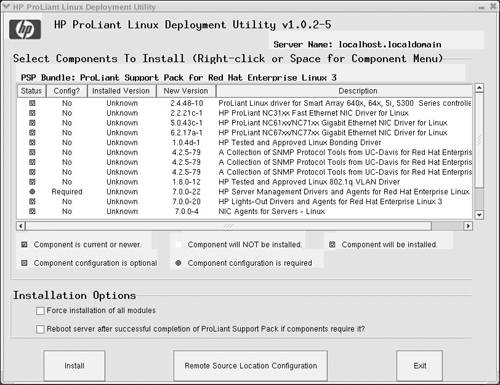 To download the LDU with PSPs for Linux, go to http://www.hp.com/support/files. Figure 15-18. ProLiant Deployment Utility for Novell NetWare main window.
! Important Root access is required for the LDU. If you do not have root access, the installation will not proceed. The utility has two modes of operation:
The LDU supports deployment on the local server only. Although the deployment can be executed from a secure shell to a remote server, it can be deployed only on the server that contains the PSP and the LDU. Some components may require optional configuration settings. Configuration parameters can include information necessary to set up the component correctly or passwords required for software installed by the component. The three methods for configuring a component are as follows:
If the optional configuration data for a component is not provided and the component has not been installed previously, it will use default values for that configuration data. If the component has been previously installed and configured, the existing configuration information will be preserved if no changes are made to the configuration data. Note Starting with ProLiant Support Pack 7.00, the HTTP server passwords no longer default to Compaq if you do not specify them. If you do not set the HTTP server passwords, connectivity to the HTTP server will fail. If you need more information on configuring and installing PSPs on ProLiant servers using different operating systems, refer to the PSP user guide. This guide is available on the SmartStart CD in the \compaq\csp folder, or you can download it from the HP Web site (http://www.hp.com). |
| < Day Day Up > |
EAN: 2147483647
Pages: 278
